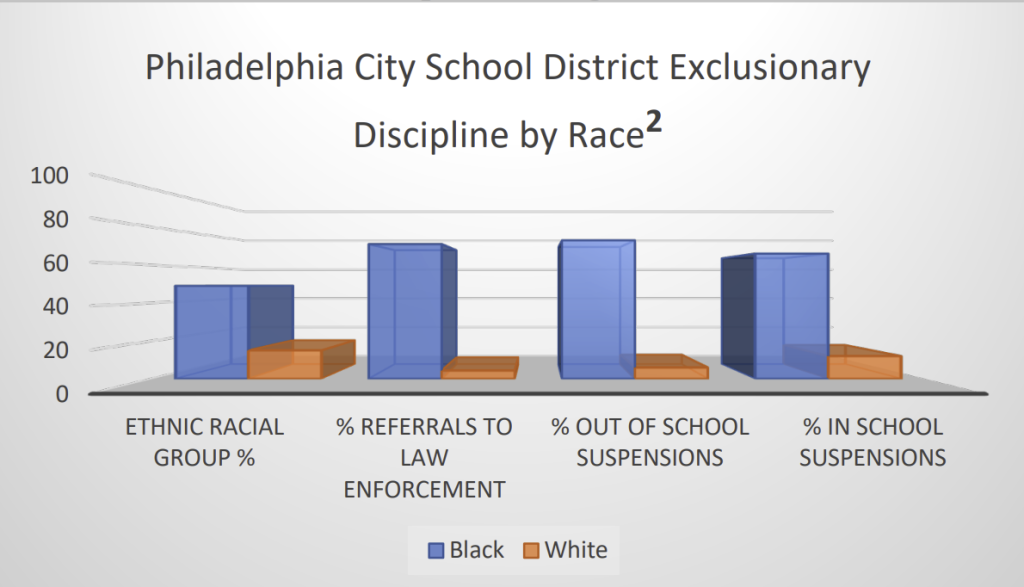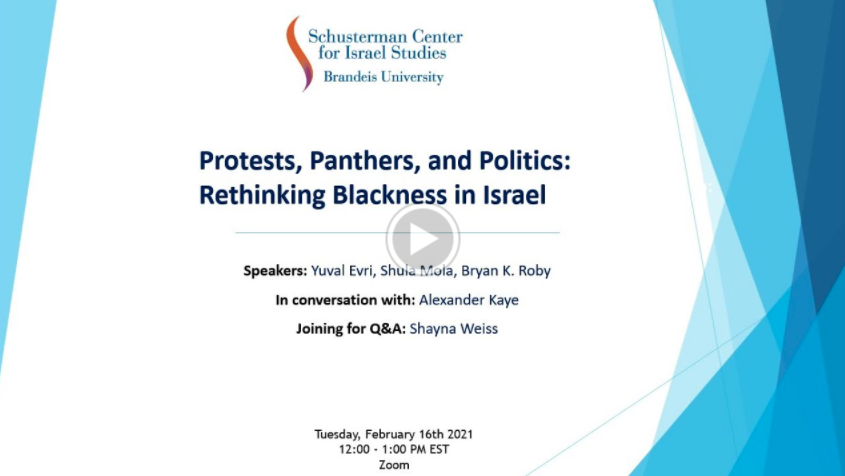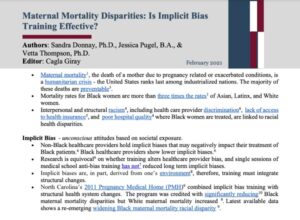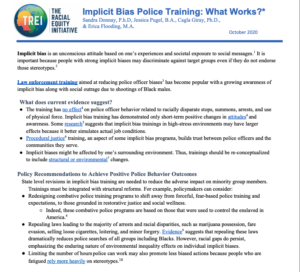Pennsylvania’s School Discipline Crisis
Just Discipline: A Restorative Justice Solution
Jacklin Solomon, Sandra M. Donnay, Ph.D., & James P. Huguley, Ed.D.
October 2021
- Starting as early as preschool,3 about 94,000 children were suspended in Pennsylvania schools for the 2017 – 2018 school year.1
- Black children in Pennsylvania are about 5 times more likely to be suspended than White children.1
- Black children comprise 40% of out of school suspensions, and 32% of expulsions, yet they comprise about 15% of the school population.1
Public schools with high proportions of Black children use more exclusionary and less reparative discipline strategies.4

- Black children are more likely to be disciplined for minor infractions than White children.5
- Exclusionary practices cause psychological harm.9 They also ignore and exacerbate Black children’s traumatic responses from concurrent intergenerational and environmental racial stressors.6,9,10
- Exclusionary practices are ineffective.5 They are associated with low academic performance even for non-suspended students,12,13 increased behavior problems,5 school drop-out,13 arrests and incarceration.7
Just Discipline
An Effective and Evidence-Based Restorative Justice Policy Solution
- A framework of restorative justice is a fundamental shift in thinking about school environments and discipline.10 Restorative practices promote:
- School environments that focus on building strong relationships among teachers, staff, children, and families.8,10
- Discipline strategies prioritizing accountability, communal decision-making, and restoring relationships over punitive and exclusionary discipline.
11
- The Just Discipline intervention has demonstrated success in:
- Reducing behavior infractions and suspensions.10
- Improving academic performance.10
- Improving student relationships, staff satisfaction, and school climate.10
- Implementing Just Discipline involves district buy -in, specialized staff and training, student therapeutic support, disaggregated data, and teacher collaboration.10
Brandeis University Webinar:
Protests, Panthers, and Politics:
Rethinking Blackness in Israel
Click here to view.
1. U.S. Department of Education Office of Civil Rights Data Collection. (2017-2018) State and National Data
Estimations. https://ocrdata.ed.gov/estimations/2017-2018.
2. U.S. Department of Education Office of Civil Rights Data Collection. (2017). Discipline Report. NCES ID:
4218990. Philadelphia City SD, PA.
https://ocrdata.ed.gov/profile/9/district/27031/disciplinereport?report=true.
3. U.S. Department of Education Office of Civil Rights Data Collection. (2017). Preschool Suspension and
Expulsion. NCES ID: 4218990. Philadelphia City SD, PA.
https://ocrdata.ed.gov/profile/9/district/27031/preschoolsuspensionandexpulsion.
4. Payne, A.A., & Welch, K. (2013). Restorative justice in schools: The influence of race on restorative
discipline. Youth & Society, 1-26.
https://citeseerx.ist.psu.edu/viewdoc/download?doi=10.1.1.917.6827&rep=rep1&type=pdf.
5. Amemiya, J., Mortenson, E., & Wang, M. (2020). Minor infractions are not minor: School infractions for
minor misconduct may increase adolescents’ defiant behavior and contribute to racial disparities in school
discipline. American Psychologist, 75, 1, 23-36.
6. Dutil, S. (2020). Dismantling the school-to-prison pipeline: A trauma-informed, critical race perspective
on school discipline. Children & Schools, 42, 3, 171-178.
7. Barnes, J.C., & Motz, R.T. (2018). Reducing racial inequalities in adulthood arrest by reducing inequalities
in school discipline: Evidence from the school-to-prison pipeline. Developmental Psychology, 54, 12, 2328
-2340. http://dx.doi.org/10.1037/dev0000613
8. Anyon, Y., Atteberry, B. Yang, J., Pauline, M. Wiley, K., Cash, D. Downing, B., Greer, E., & Pisciotta,L.
(2018). It’s all about the relationships”: Educators’ rationales and strategies for building connections with
students to prevent exclusionary school discipline outcomes. Children & Schools, 40, 4, 221-230.
9. Gerlinger, J., Viano, S., Gardella, J.H., Fisher, B.W., Curran, F.C., & Higgins, E.M. (2021). Exclusionary
school discipline and delinquent outcomes: A meta-analysis. Journal of Youth and Adolescence, 50, 1493-
1509.
10. Huguely, J.P., Wang, M.T., Pasarow, S., & Wallace, J.M., (2021). Just Discipline in schools: An integrated
and interdisciplinary approach. Children & Schools, 42, 3, 195-199.
11. Hopkins, B. (2002). Restorative justice in schools. Support for Learning, 17, 144-149.
12. Perry, B.L., & Morris, E.W. (2014). Suspending Progress: Collateral consequences of exclusionary
punishment in public schools. American Sociological Review, 79,6, 1067-1087.
https://doi.org/10.1177/0003122414556308.
13. Morris, E.W., & Perry, B.L. (2016). The punishment gap: School suspension and racial disparities in
achievement. Social Problems, 63, 68-86.




